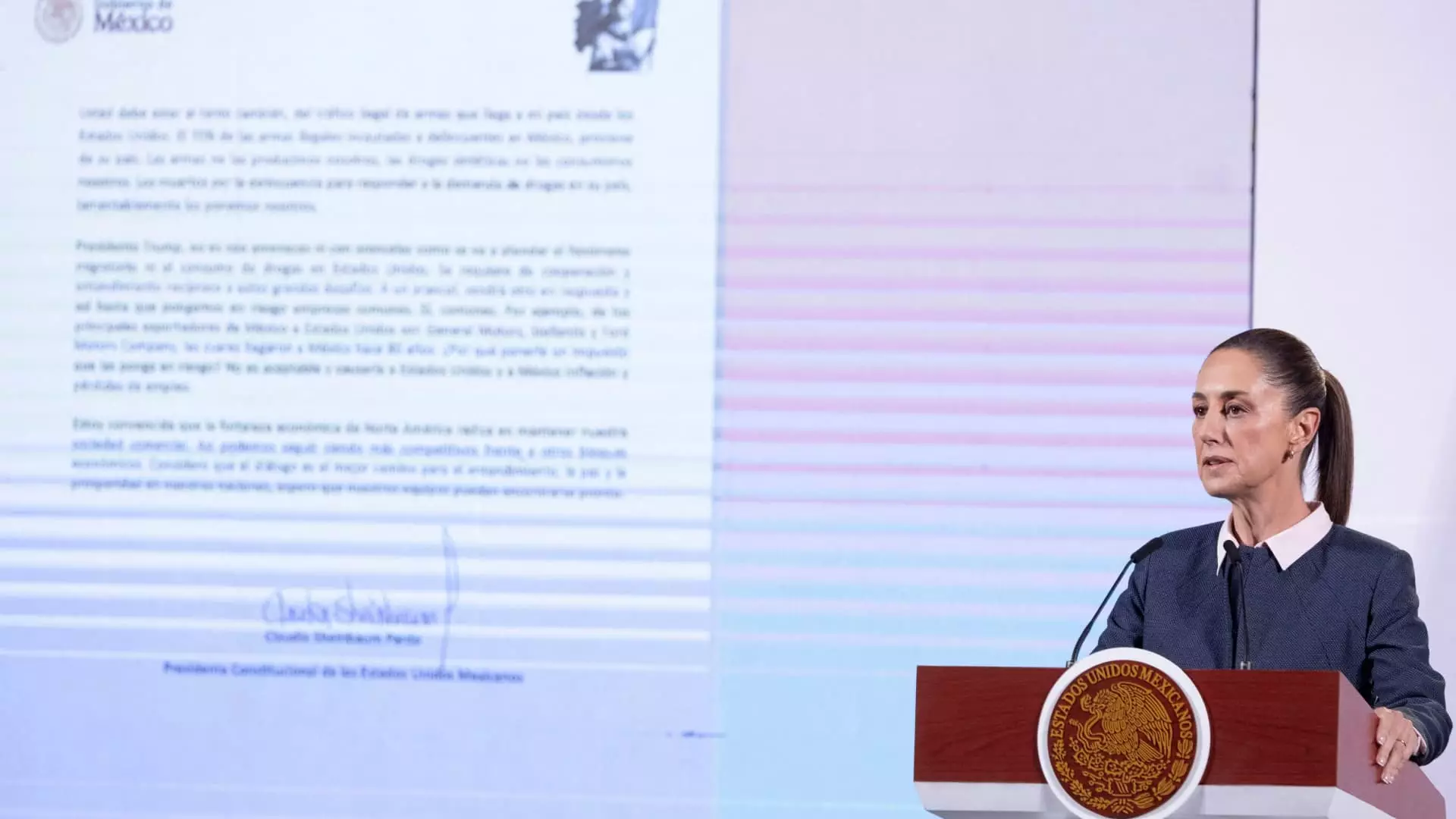As U.S. President-elect Donald Trump prepares for his term, he has proposed a sweeping 25% tariff on goods imported from Mexico, sparking strong reactions from Mexico’s leadership. Claudia Sheinbaum, the Mexican President, has strongly condemned the potential tariffs, labeling them as a declaration of trade war that could have dire economic consequences. Sheinbaum’s assertion highlights the interconnected nature of U.S.-Mexico trade relations, emphasizing that tariffs could jeopardize a vast number of jobs while raising costs for consumers across the border.
The implications of such tariffs extend beyond mere economic metrics. They threaten to undermine the stability of integrated supply chains that constitute the backbone of the North American automotive sector. As an export-driven economy, Mexico could find itself in a precarious position if Trump’s administration moves forward with these plans.
During a recent press conference, Sheinbaum articulated her government’s position on retaliatory measures, making it clear that Mexico would respond in kind should tariffs be imposed. Alongside her, Economy Minister Marcelo Ebrard reinforced this stance, advocating for unity and cooperation over confrontational trade policies. Ebrard’s phrases reflect a broader sentiment – that escalating tariff wars would only serve to harm economies on both sides of the border.
Ebrard pointed to the perilous effects of these tariffs, particularly on the automotive industry, which relies heavily on cross-border trade. With 88% of pickup trucks sold in the U.S. manufactured in Mexico, the impact of a $3,000 price increase per vehicle would not be trivial. The automotive giants—Ford, General Motors, and Stellantis—could see their business models threatened, further illustrating how interconnected economic systems can become casualties of political agendas.
In response to these growing tensions, a phone call between Sheinbaum and Trump provided a platform for dialogue. Trump sought assurances regarding migration control, which he has frequently cited as a primary justification for his proposed tariffs. However, Sheinbaum emphasized that Mexico is committed to enhancing cooperation, fostering mutual growth rather than erecting barriers. Her insistence on “building bridges” rather than “closing borders” underscores a willingness to engage collaboratively, even in the face of threats.
This dynamic illustrates the challenges both leaders face in managing public image while addressing deep-rooted issues such as migration and trade. Trump’s portrayal of the negotiations as productive contrasts sharply with Sheinbaum’s determination to maintain Mexico’s sovereignty and economic interests.
The Economic Landscape
The potential fallout from these tariffs could lead to significant disruptions for U.S. automakers, as analysts warn that Trump’s aggressive trade policy might obliterate profits for major companies. The multibillion-dollar stakes in the automotive sector mean that both U.S. and Mexican economies are considered vulnerable if policies take a restrictive turn. Tariffs may not only compromise profitability but could also contribute to broader economic malaise, worsening inflation and unemployment in both nations.
Analysts from Barclays project that if these tariffs are enacted, the results could be catastrophic for Detroit’s automotive industry, underscoring a projection of a grim landscape in which trade stringent measures backfire on the very workers they aim to protect. Concerns over higher consumer costs resonate deeply with middle-class Americans, providing fertile ground for dissent against a priority on tariffs over productive trade negotiations.
Trading volumes between the U.S., Canada, and Mexico have evolved under the USMCA trade agreement, which is up for review in 2026. The prospect of meaningful renegotiation looms large as a response to shifting political winds. Experts suggest that the integration of national interests may force a more comprehensive reevaluation rather than mere adjustments to existing frameworks.
The leadership of Ebrard and Sheinbaum indicates a robust inclination to navigate these tumultuous waters with an aim towards sustainable regional economic cooperation. Their foresight dims the prospects of fragmented trade relations and promotes a collective effort for reform rather than confrontation.
In light of escalating tensions and the specter of trade conflicts, Mexico’s leadership underscores the importance of mutual collaboration and dialogue. The economic stakes are considerable, not just for Mexico but for a substantial number of U.S. workers as well. As the Biden administration prepares to tackle myriad challenges, recognizing the intricacies of trade relationships and addressing them through partnership may be the most prudent path forward, steering away from the perils of isolationism and tariffs. The road ahead is laden with complexity, but opportunity lies in collaborative fortitude.



Leave a Reply